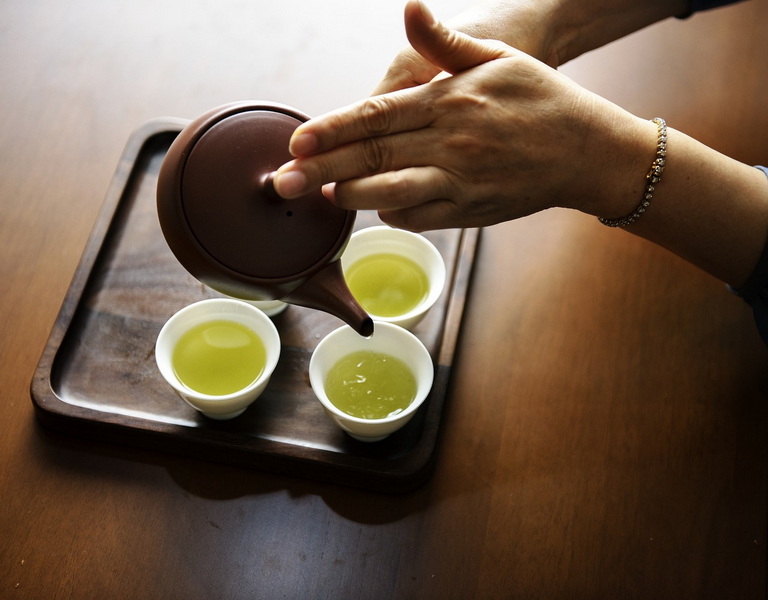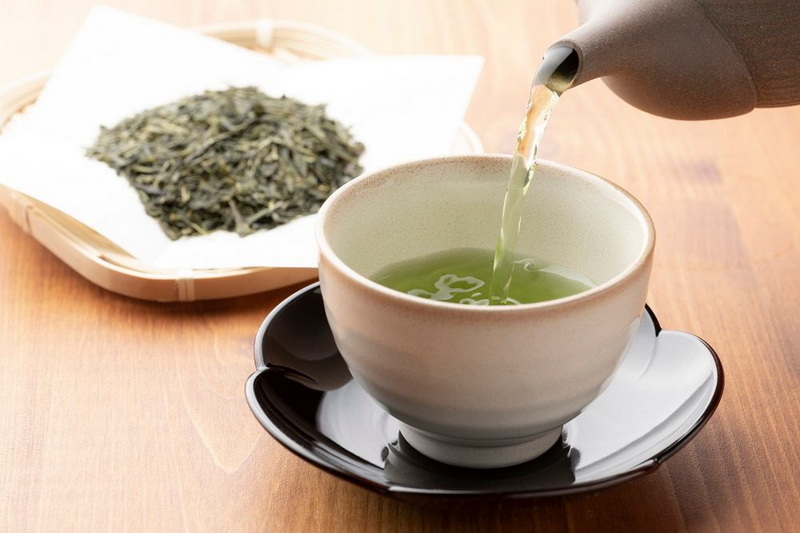Content Menu
● Introduction to Green Tea Extract
>> Key Components of Green Tea Extract
● Chemical Composition
>> 1. Polyphenols
>>> Types of Polyphenols:
>> 2. Catechins
>>> Major Catechins:
>> 3. Caffeine
>>> Caffeine Content:
>> 4. Amino Acids
>>> Theanine Benefits:
>> 5. Vitamins and Minerals
>>> Key Nutrients:
● Health Benefits of Green Tea Extract
>> 1. Antioxidant Properties
>> 2. Weight Loss Support
>> 3. Heart Health
>> 4. Brain Function Enhancement
>> 5. Skin Health
>> 6. Anti-Cancer Potential
● How to Use Green Tea Extract
>> Dietary Supplements
>> Culinary Uses
>>> Example Recipe:
● Potential Side Effects
>> Safety Precautions:
● Conclusion
● FAQ
>> 1. What Are the Main Components Found in Green Tea Extract?
>> 2. How Much EGCG Is Typically Found in Green Tea Extract?
>> 3. Can Green Tea Extract Help with Weight Loss?
>> 4. Are There Any Side Effects Associated with Green Tea Extract?
>> 5. How Should I Take Green Tea Extract for Best Results?
● Citations:
Green tea extract is a concentrated form of green tea that has gained significant popularity due to its numerous health benefits. Rich in antioxidants and other bioactive compounds, it is used in dietary supplements, skincare products, and even culinary applications. This article will delve into the chemical composition of green tea extract, highlighting its key components, their health benefits, and how they can be utilized effectively.

Introduction to Green Tea Extract
Green tea extract is derived from the leaves of the Camellia sinensis plant. Unlike traditional green tea, which is brewed and consumed as a beverage, green tea extract is concentrated to provide a higher dosage of beneficial compounds in a smaller volume. The extraction process typically involves using water or alcohol to isolate the active ingredients.
Key Components of Green Tea Extract
The primary components of green tea extract include:
- Polyphenols
- Catechins
- Caffeine
- Amino Acids
- Vitamins and Minerals
These compounds contribute to the extract's antioxidant properties and overall health benefits.
Chemical Composition
1. Polyphenols
Polyphenols are natural compounds found in plants that have antioxidant properties. In green tea, polyphenols account for about 20-30% of its dry weight. They are primarily responsible for the health benefits associated with green tea extract.
Types of Polyphenols:
- Flavonoids: A subgroup of polyphenols that includes catechins.
- Phenolic Acids: Such as gallic acid and chlorogenic acid.
2. Catechins
Catechins are a specific type of flavonoid that are abundant in green tea. They are known for their strong antioxidant effects and have been extensively studied for their health benefits.
Major Catechins:
- Epigallocatechin Gallate (EGCG): The most researched catechin with potent antioxidant properties.
- Epicatechin (EC)
- Epicatechin Gallate (ECG)
- Gallocatechin (GC)
3. Caffeine
Green tea extract contains caffeine, though in lower amounts compared to coffee. Caffeine contributes to increased alertness and may enhance metabolic rate.
Caffeine Content:
Typically, one capsule of green tea extract contains about 20-30 mg of caffeine.
4. Amino Acids
One notable amino acid found in green tea is theanine, which has calming effects and may counteract some of the stimulating effects of caffeine.
Theanine Benefits:
- Promotes relaxation without drowsiness.
- Enhances cognitive function and focus.
5. Vitamins and Minerals
Green tea extract also contains various vitamins and minerals, albeit in smaller amounts compared to other components.
Key Nutrients:
- Vitamin C: An antioxidant that supports immune function.
- Minerals: Such as manganese, magnesium, and potassium.

Health Benefits of Green Tea Extract
The unique composition of green tea extract contributes to a variety of health benefits:
1. Antioxidant Properties
The high concentration of catechins provides powerful antioxidant effects that help protect cells from oxidative stress and free radical damage. This can reduce the risk of chronic diseases such as heart disease, diabetes, and cancer.
2. Weight Loss Support
Green tea extract has been shown to increase metabolism and fat oxidation, making it a popular supplement for weight management. Studies have indicated that regular consumption can lead to significant fat loss over time when combined with exercise and a healthy diet.
3. Heart Health
Regular consumption may improve heart health by reducing LDL cholesterol levels and improving overall cardiovascular function. The anti-inflammatory properties of catechins also contribute to better blood circulation and reduced blood pressure.
4. Brain Function Enhancement
The combination of caffeine and theanine can improve cognitive performance, attention, and mood. Research suggests that these compounds may help protect against neurodegenerative diseases such as Alzheimer's by reducing inflammation and oxidative stress in the brain.
5. Skin Health
Due to its anti-inflammatory properties, green tea extract is often used in skincare products to reduce acne and improve skin elasticity. The antioxidants present can help combat signs of aging by protecting against UV damage and promoting skin repair.
6. Anti-Cancer Potential
Emerging research suggests that the polyphenols in green tea extract may play a role in cancer prevention by inhibiting tumor growth and inducing apoptosis (programmed cell death) in cancer cells. While more studies are needed, preliminary findings are promising.
How to Use Green Tea Extract
Green tea extract can be consumed in various forms:
Dietary Supplements
Available as capsules or powders, these supplements can be taken daily for general health benefits or targeted uses such as weight loss or improved metabolism.
Culinary Uses
Incorporate green tea extract into smoothies, baked goods, or salad dressings for an extra health boost.
Example Recipe:
- Green Tea Smoothie: Blend spinach, banana, almond milk, and a teaspoon of green tea extract for a refreshing drink.
Potential Side Effects
While generally considered safe when consumed appropriately, excessive intake can lead to side effects such as:
- Liver toxicity (especially at high doses)
- Stomach upset
- Insomnia due to caffeine content
- Headaches or dizziness in sensitive individuals
Safety Precautions:
- Consult with a healthcare provider before starting any new supplement.
- Monitor dosage carefully; avoid exceeding recommended amounts without medical supervision.
- Be aware of potential interactions with medications, particularly blood thinners or stimulants.
Conclusion
Green tea extract is a powerful supplement packed with antioxidants and beneficial compounds that can enhance overall health when used responsibly. Its diverse applications—from dietary supplements to skincare—make it a versatile addition to any wellness regimen. As research continues to explore its potential benefits further, incorporating green tea extract into your daily routine may provide numerous advantages for both physical and mental well-being.

FAQ
Here are some frequently asked questions about what green tea extract contains:
1. What Are the Main Components Found in Green Tea Extract?
The main components include polyphenols (especially catechins like EGCG), caffeine, amino acids (such as theanine), vitamins (like vitamin C), and minerals (such as manganese).
2. How Much EGCG Is Typically Found in Green Tea Extract?
A standard serving can contain about 25–30 mg of EGCG per capsule or serving size, depending on the concentration of the extract.
3. Can Green Tea Extract Help with Weight Loss?
Yes! Studies suggest that green tea extract can aid weight loss by increasing metabolism and fat oxidation when combined with a balanced diet and exercise.
4. Are There Any Side Effects Associated with Green Tea Extract?
While generally safe at recommended doses, excessive intake can lead to liver toxicity, stomach upset, or insomnia due to caffeine content.
5. How Should I Take Green Tea Extract for Best Results?
It is best taken with food to enhance absorption; typical dosages range from 250 mg to 500 mg per day based on individual health needs.
Citations:
[1] https://patents.google.com/patent/US20160219897A1/en
[2] https://nioteas.com/blogs/tea-facts/chemical-composition-of-green-tea
[3] https://www.eatthismuch.com/calories/green-tea-extract-1659251
[4] https://pmc.ncbi.nlm.nih.gov/articles/PMC9231383/
[5] https://pubmed.ncbi.nlm.nih.gov/17899383/
[6] https://www.healthline.com/nutrition/10-benefits-of-green-tea-extract
[7] https://pmc.ncbi.nlm.nih.gov/articles/PMC6271668/
[8] https://pubs.acs.org/doi/10.1021/acs.jpcb.5b08737






























